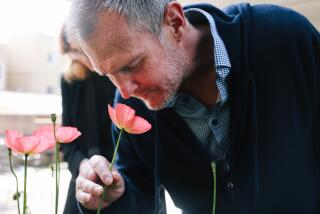Going From Frail to Functional Takes Work
- Share via
A beefy 40-year-old man in hairnet and baseball cap, Robert stands on the cement floor of a wholesale bakery four hours a day stuffing hundreds of crusty French loaves into their long paper sacks. His job defines the concept of routine. It is uncreative, tedious and exhausting. You or I would hate it.
But for him, bread is the staff of life.
Robert has been working at the New French Bakery in Ventura for a little more than a year. He was hired by the owner, Badou Niang, an elegant man with a deep, calming voice and a French accent as thick as a decent Hollandaise.
Badou grew up in the West African nation of Senegal. He studied aviation in France and Canada, but deteriorating eyesight squelched his dream of becoming a pilot. At loose ends, he was lured by friends to Santa Barbara and, eventually, to a career in baking.
“The weather was not so different from the place where I was born,” he said.
Robert grew up in Ventura. An aspiring engineer, he studied science at Ventura College but he, too, was betrayed by his body. At 20, just as he was applying to a four-year college, he started hearing voices. His schizophrenia emerged with horrifying swiftness. For much of the next two decades, he lived through varying shades of despair, and his family would experience unceasing anguish.
Now he’s talking about maybe trying to sign on at the bakery full time.
*
As the heady smell of baking bread suffused his office, Badou told me why he didn’t bid a polite au revoir to the lady from the county who called last year to interest him in taking on some mentally ill workers. It wasn’t the modest tax break employers can receive; to Badou, hiring a schizophrenic was simply a matter of decency.
“They don’t choose to be that way,” he said. “If I were the parent of someone like this, I’d be happy to have someone helping my child.”
Badou’s grandfather, who ran a trucking company in Dakar, invited his workers home to lunch each noon. Likewise, Badou helps where he can. A small loan to an employee in trouble is repaid in loyalty; when a driver calls in sick at midnight, Badou is never frantic for a substitute.
Badou hired three men through the county’s Supported Employment program. One soon left but Robert and another are valued employees. They arrive on time, diligently do their unheroic jobs, call in when they’re sick, ask for time off weeks in advance.
“Of my 36 employees, they’re among the 10 best,” Badou said.
Robert had done construction work as a teenager, but after that he didn’t work.
“I’ve been in mental health--’the system,’ as they call it--since I was in my early 20s,” he said.
For years, he lived in a hellish wonderland of medications with side effects ranging from uncontrollable jitters to drooling. None seemed to work for long. He drifted from one board-and-care to the next. Looking back on it, his father, Vincent, said Robert was sometimes so angry he couldn’t function.
“I thought this poor kid would end up dying young, maybe blow his stack in a cop shooting,” he said. “Who knows?”
But Vincent was quick to praise the county mental health counselors and psychiatrists who came to care for his son. After so much frustration, they found a medication six years ago that made the difference between a Robert frail and a Robert functional.
They also channeled him into Supported Employment. Two dozen others--factory workers, computer techs, even an executive secretary--are working at companies throughout the county under the program.
The program’s “job coaches” help workers who may never have worked through the initial rough spots: What if I can’t keep up? How do I tell my co-workers about myself? When do I go to my supervisor?
Even with such help, the program is a tough sell to employers. Business owners hear the term “mentally ill” and picture a fired employee striding purposefully through his old office with a gun. What they don’t picture is the top salesman who takes Prozac or the vice president who spends her lunch hour every Tuesday in therapy.
*
For Robert, it’s the first time in adult memory he’s earned enough for a movie or a bus trip to his favorite coffee shop for a bite to eat. Part of what the county calls a “semi-independent living” arrangement, he bunks with three other men in an east Ventura house. A social worker checks in on them regularly.
“It’s great to have a little money in your pocket,” Robert said. “And it’s progress, actually. It means the medicine and the therapy are working.”
So what if it’s not the life he’d plotted out at 20?
His dad remembers when Robert was alone and despairing in a motel, unable to care for himself.
“Now he asks, ‘Do you want me to come over and help clean the house?’ ”
More to Read
Eat your way across L.A.
Get our weekly Tasting Notes newsletter for reviews, news and more.
You may occasionally receive promotional content from the Los Angeles Times.











